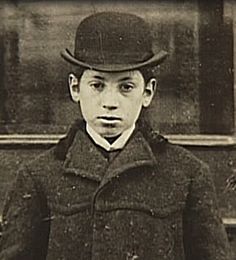Arthur "Harpo" Marx (November 23, 1888 – September 28, 1964) was an American comedian, actor, mime artist, and harpist, and the second-oldest of the Marx Brothers. In contrast to the mainly verbal comedy of his brothers Groucho and Chico, Harpo's comic style was visual, being an example of both clown and pantomime traditions. He wore a curly reddish blond wig and was silent in all his movie appearances, instead blowing a horn or whistling to communicate.
Born Adolf Marx in New York City, one of six sons born to immigrants Miene 'Minnie' Schönberg and Samuel Marx. He attended school until the second grade, dropping out at the age of eight. He was infatuated with music, but when the family bought a piano, they could afford lessons for only one, and they went to older brother, Leonard 'Chico' Marx. Despite this set back, he self-taught himself the piano, and discovered he had an innate talent for musical instruments. Despite never learning to read music, he easily picked up several other instruments, including the harp, which would eventually give him his stage name.
He joined the family vaudeville act after gaining employment in numerous odd jobs alongside his older brother Chico to contribute to the family income, including selling newspapers, working in a butcher shop, and as an office errand boy. He then began to develop the pantomime for which he became so well known. In early vaudeville roles he would perform speaking parts until he reportedly read one review in which a critic was said to have noted that Harpo was brilliant, his pantomime hilarious, but the effect was spoiled when he spoke. He took the criticism to heart, and never spoke another word on stage or in front of a camera while in character.
During World War I, he changed his name from the Germanic Adolf to the more acceptable Arthur. Despite his lack of formal education, his intelligence and wit were sharp, and he was included as a member of the Algonquin Round Table in New York City. The Marx Brothers had an extremely successful stage career in New York prior to their movie debut in 1929 in 'The Cocoanuts,' which was a direct translation from stage to screen. Their first motion picture was filmed in New York City, the rest would be made in Hollywood. Over their career, the brothers produced more than a dozen collaborative movies, supposedly one every time one of the brothers needed money.
He married actress Susan Fleming in 1936, and they adopted four children together. During World War II, he performed on War Bonds tours, and worked to entertain Allied troops. After the final official Marx Brothers film, Love Happy, in 1949, Harpo's solo career was largely reduced to cameos and television appearances. The Harpo persona was predominantly mute, so his solo career was rather limited by how creative he could be. However, there was one time when he narrated a DuPont Show of the Month entitled The Red Mill, broadcast on April 19th, 1958 - albeit through the medium of a harp (he was helped vocally by co-narrator Evelyn Rudie).
Another mute outing was in the General Electric Theater's The Incredible Jewel Robbery (March 8th, 1959), which he agreed to appear in for the sake of co-star Chico Marx, who needed the money to pay off his gambling debts. For Christmas 1960, Harpo appeared as Benson in another DuPont Show, Silent Panic, in which he played a deaf-mute who, as a mechanical man in a department store window, witnesses a gangland murder. It's a great mime performance from Harpo, despite some unintentionally creepy make-up!
Harpo's final two screen appearances would both come in 1962. First of all there was a Red Skelton Hour production entitled Somebody Up There Should Stay There, broadcast on September 25th, 1962, almost exactly two years before he would pass away. Harpo played a Guardian Angel. Finally, on October 20th, 1962, Harpo appeared as himself in the TV series Mr Smith Goes to Washington, starring Fess Parker, in the episode Musicale.
Wikipedia claims Harpo's final public appearance took place on January 19th, 1963, when he was aged 74, but fails to mention where (further research on Harpo's Place reveals that it may have been Pasadena, California). It claims Harpo was in the company of singer and comedian Allan Sherman, and was there to announce his retirement from the entertainment business.
Harpo's very last professional work was, true to form, playing the harp on Mahalia Jackson's album Let's Pray Together, released 1964, as well as a live appearance at the Palm Springs Police Charity Ball just weeks before he died. On Sunday, September 27th, 1964, he underwent open heart surgery in a West Los Angeles hospital. Sadly, he died, aged 75, the following day of a heart attack - it was he and his wife Susan's 28th wedding anniversary.
 |
| Harpo & Family |
It was the funeral of Harpo Marx that Groucho Marx's son Arthur claimed was the only time he ever saw his father cry. Harpo’s harps were donated to the State of Israel by his wife Susan. His remains were cremated and scattered over the seventh hole of the Rancho Mirage golf course in California, where he used to play the game every month.
(Edited from A Final Curtain Call, Findagrave & Wikipedia)







